Learning a new language can feel like standing at the base of a mountain. It’s exciting, but also a little overwhelming. That’s where language apps come in. Two of the most talked-about are Rosetta Stone and Babbel. Both are popular, but they take different paths to help you reach the top.
So, which one is better for you? In this deep comparison, we’ll explore every angle — from teaching style and user experience to value for money — and help you decide. And yes, we’ll also explain why Rosetta Stone may just have the edge.
The Basics: What Are Rosetta Stone and Babbel?
Before we dive deep, let’s quickly go over what each app is all about.
Rosetta Stone
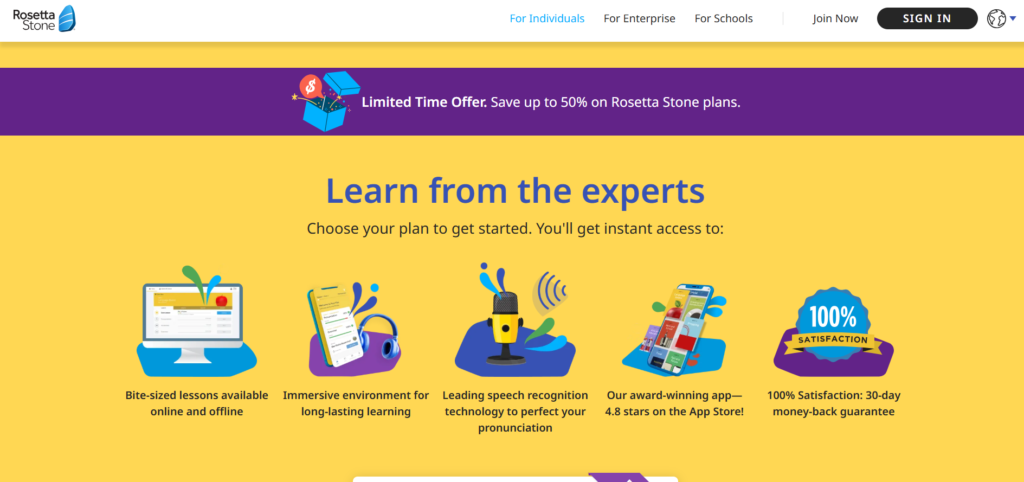
Rosetta Stone is one of the oldest names in language learning. It launched in 1992 and is known for its immersive method — teaching you using pictures, sounds, and full sentences, without any translations. It’s designed to mimic how children learn their first language.
Babbel
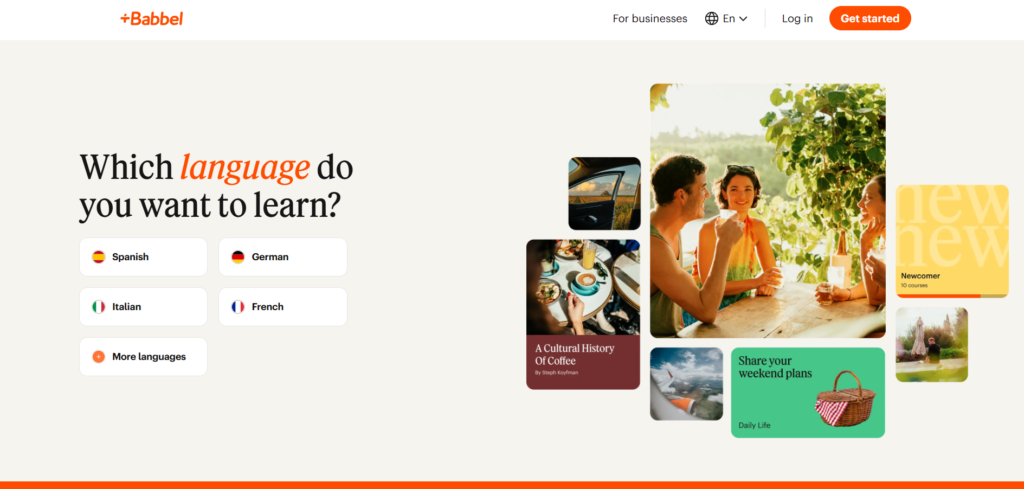
Babbel, founded in 2007, is newer and takes a more traditional approach. It teaches through structured lessons, explanations, and lots of real-world dialogue. Babbel focuses more on conversation and grammar for quick, everyday use.
Language Selection: How Many Languages Can You Learn?
When choosing a language app, the first question is simple: Does it offer the language you want to learn?
Rosetta Stone
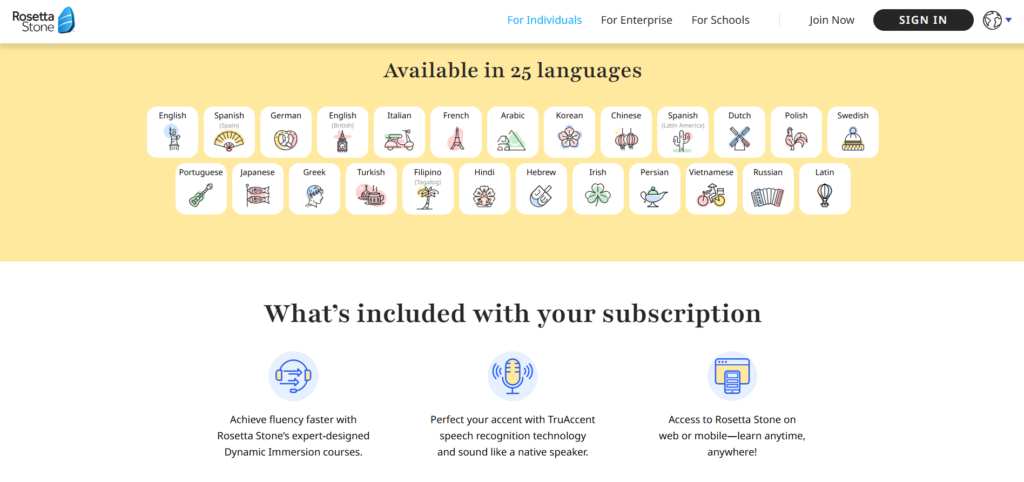
- Offers 25 languages, including French, Spanish, German, Japanese, Arabic, Tagalog, Farsi, and Swahili.
- Includes less common languages — a great plus if you’re learning something unique.
Babbel
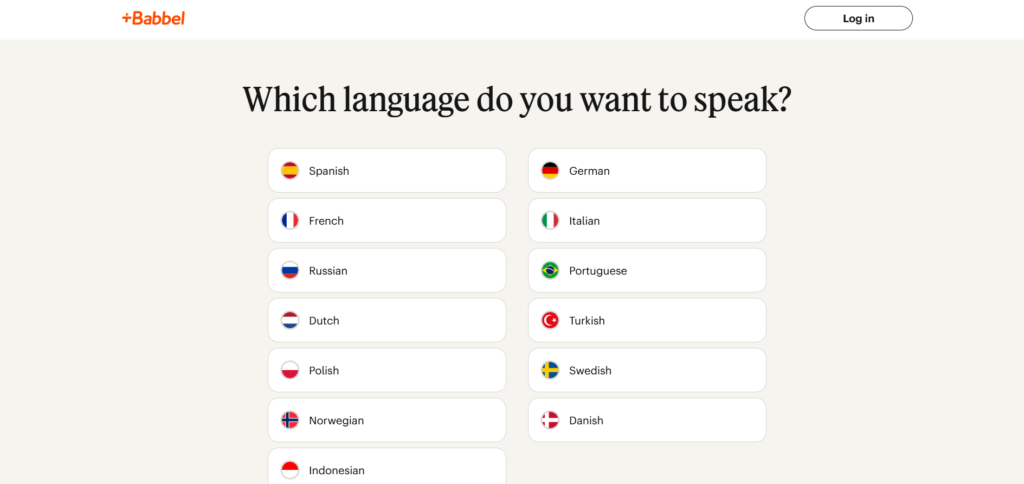
- Offers 14 languages, mainly focusing on European ones like French, Spanish, German, Italian, Dutch, and Swedish.
- Does not include languages like Korean, Japanese, or Vietnamese.
Winner: Rosetta Stone, for its broader selection and rare language options.
Teaching Method: Immersion vs. Explanation
This is where things get interesting. Rosetta Stone and Babbel use totally different teaching styles.
Rosetta Stone: Learn Like a Child
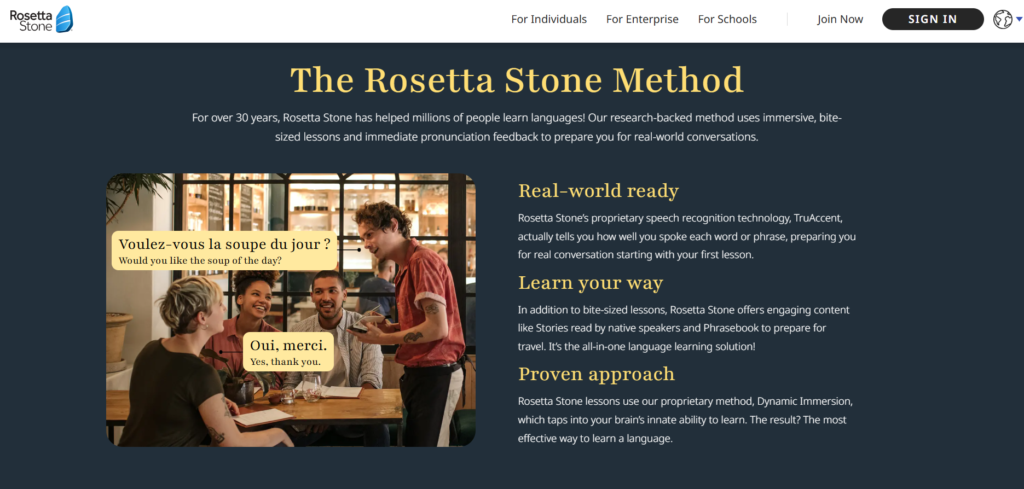
- Uses what they call “Dynamic Immersion.”
- No translations — you match images to words, hear native pronunciation, and build meaning naturally.
- Helps you think in the new language instead of translating from English.
Babbel: Learn Through Structure
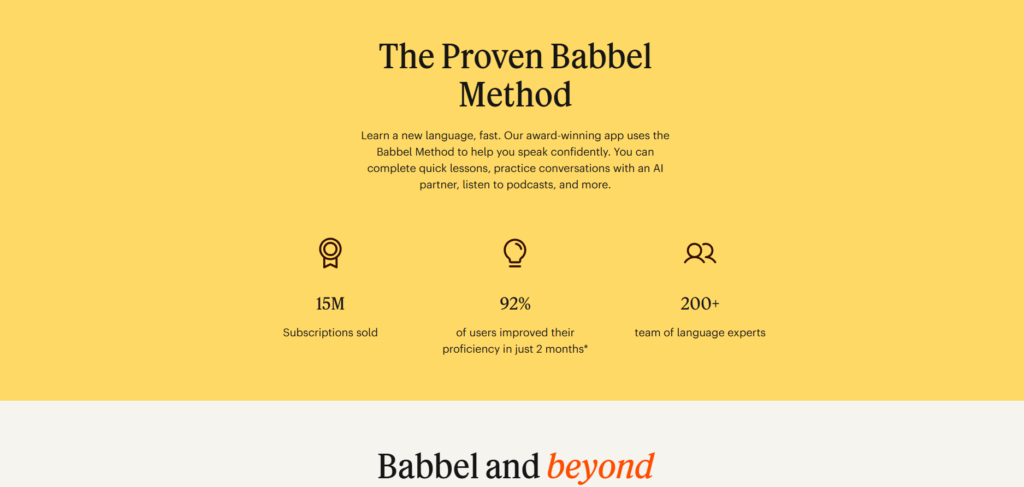
- Lessons are more like a textbook — with grammar rules, vocabulary lists, and translations.
- You learn phrases for travel, business, or daily use.
- Great for learners who like to know why something is said a certain way.
Winner: Depends on your style, but for deep, long-term fluency, Rosetta Stone creates a stronger foundation.
Speech Practice: Which App Helps You Sound Like a Native?
Pronunciation is a big deal. And thankfully, both apps have tools for this.
Rosetta Stone
- Uses TruAccent, a top-rated speech recognition tool.
- Gives instant feedback on your pronunciation.
- Helps you build a more authentic accent early on.
Babbel
- Also has speech recognition, but reviews suggest it’s not as refined.
- Some users report it’s easy to “cheat” or get false positives.
Winner: Rosetta Stone, for more accurate pronunciation feedback.
Learning Experience: Which App Feels Better to Use?
We’ve all quit apps that were clunky or boring. So how do these two feel when you’re using them?
Rosetta Stone
- Beautiful, image-based interface.
- No clutter — just immersive content.
- Some beginners might find the lack of translations confusing at first, but it becomes intuitive with use.
Babbel
- Easy to follow, clear instructions.
- Mixes text, images, and audio.
- Lessons are shorter and more casual, often just 10–15 minutes.
Winner: Tie — Rosetta Stone for immersion and polish, Babbel for fast, practical lessons.
Offline Access and Flexibility
Want to learn on a plane or without data?
Rosetta Stone
- Offers full offline access.
- Lessons are downloadable on mobile.
Babbel
- Also allows you to download lessons.
- Works well offline, though some advanced features need internet.
Winner: Tie — both offer strong offline support.
Grammar and Real-Life Conversation
Here’s where Babbel shines — it teaches you how to use the language fast.
Babbel
- Puts grammar front and center.
- Teaches you how to form questions, greet people, and navigate real conversations early on.
- Ideal for travelers and casual learners.
Rosetta Stone
- Doesn’t explain grammar rules — you absorb them through context.
- Takes longer to get to conversation skills, but builds deeper knowledge.
Winner: Babbel, for fast practical use. Rosetta Stone, for long-term fluency.
Progress Tracking and Motivation
Staying motivated is half the battle.
Rosetta Stone
- Uses milestones, achievement badges, and detailed progress tracking.
- Encourages daily practice with streaks.
Babbel
- Also uses progress tracking and reminders.
- Includes quizzes and review sessions to reinforce memory.
Winner: Tie, both have helpful motivation tools.
Price: Which One Offers More Value?
Language learning is an investment. So which app gives you more bang for your buck?
Rosetta Stone
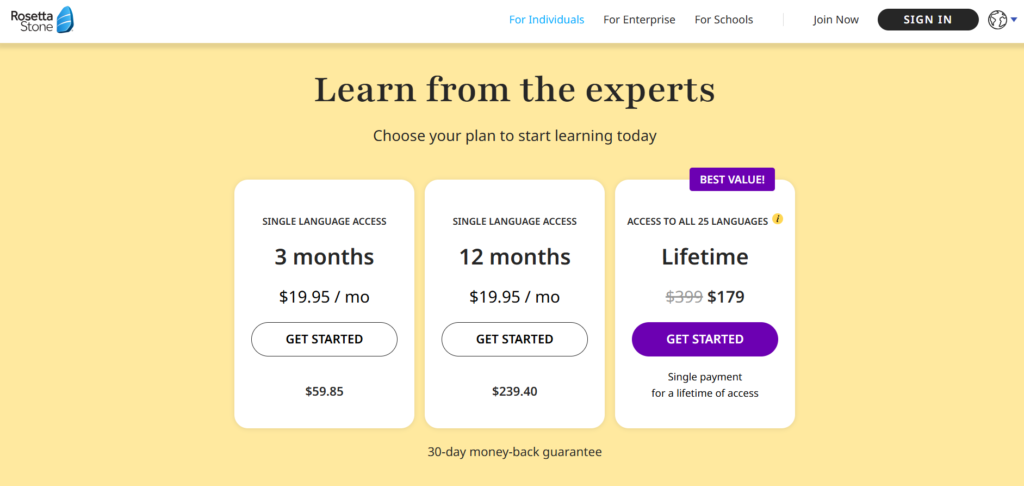
- 3-month plan: ~$47.97
- 12-month plan: ~$95.88
- Lifetime plan: ~$179 (includes all 25 languages)
Babbel
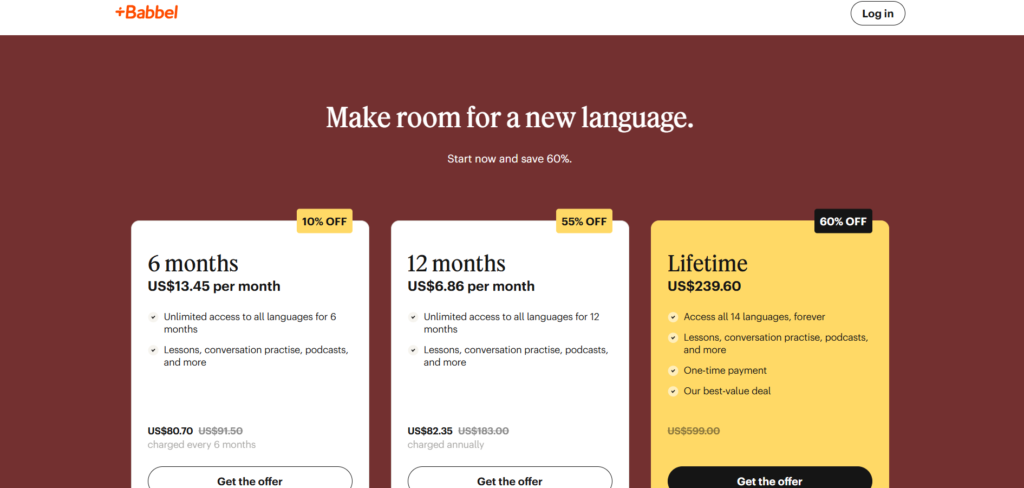
- Monthly plan: ~$13.95/month
- 3-month plan: ~$37.95
- 12-month plan: ~$89.40
- Lifetime plan (newer offering): ~$299 (single language)
Winner: Rosetta Stone, especially with its lifetime all-language deal.
What the Reviews Say
Across user forums, app stores, and expert reviews, here’s what real users highlight:
Rosetta Stone Pros
- “I feel like I’m actually thinking in Spanish.”
- “Great for pronunciation.”
- “The lifetime deal is amazing if you want to learn multiple languages.”
Rosetta Stone Cons
- “I wish it explained grammar more.”
- “Takes a little longer to get conversational.”
Babbel Pros
- “Easy to start speaking right away.”
- “Perfect for learning useful phrases before a trip.”
- “I like how it explains verb tenses.”
Babbel Cons
- “Feels like a language textbook.”
- “Speech recognition could be better.”
- “Only offers one language at a time.”
Why Rosetta Stone Is the Better Choice for Serious Learners
While Babbel is great for quick wins — like learning how to order at a café or ask directions — Rosetta Stone is better for those who want real fluency.
Here’s why Rosetta Stone stands out:
Immersion Works: By surrounding you with the language from day one, your brain starts thinking in that language naturally.
More Languages: Whether you’re learning Hindi, Korean, or Persian, you’ll find options here that Babbel doesn’t offer.
Better Pronunciation Tools: TruAccent helps you sound more native, faster.
One Price for All Languages: Their lifetime deal is unbeatable for language lovers.
Deep Learning: You may not be ordering lunch in the first hour, but give it time — and you’ll speak with confidence and understanding.
Final Verdict: Rosetta Stone or Babbel?
Let’s break it down one last time:
| Feature | Rosetta Stone | Babbel |
|---|---|---|
| Number of Languages | ✅ 25+ | ❌ 14 |
| Teaching Style | ✅ Immersive | ✅ Grammar-focused |
| Pronunciation Tools | ✅ TruAccent | ❌ Basic |
| Real-life Use Early On | ❌ Slower | ✅ Quicker |
| Price Value | ✅ Lifetime deal | ❌ Higher for one |
| Best For | Fluency & Immersion | Travel & Conversation |
Winner: If you’re serious about learning a new language deeply and thoroughly, Rosetta Stone is the better choice. It might feel slower at first, but it builds real fluency from the ground up.
FAQ’s
Is there a lifetime subscription for either app?
Yes, Rosetta Stone offers a lifetime plan, while Babbel works on a subscription basis.
Which app is better for those who prefer short lessons?
Babbel has short lessons (10-15 minutes), great for busy schedules.
Does Rosetta Stone offer a mobile app for on-the-go learning?
Yes, Rosetta Stone offers a mobile app for learning anytime, anywhere.
Which app provides more offline learning options?
Rosetta Stone allows full offline access to lessons, audio, and phrasebooks.
Which app includes real-life dialogue practice?
Babbel includes dialogues that focus on real-life conversations and scenarios.
